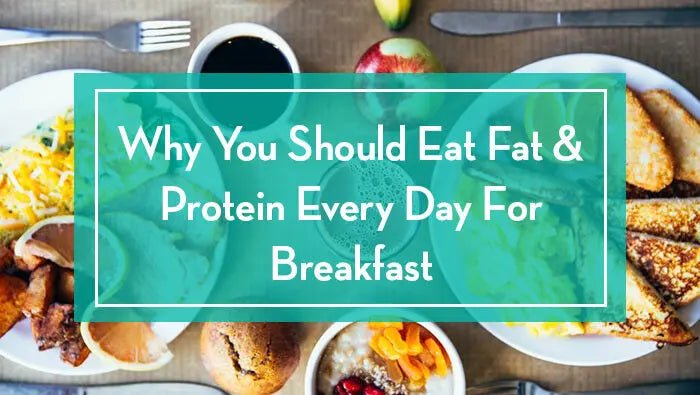Ahhh, breakfast... Bacon, eggs, hash browns? Cereal, smoothie, oatmeal? Some of us eat a big breakfast, and some of us skip it. But not only is it important to eat breakfast every day, but equally as important is what you eat! Read on to find out the best foods to eat for breakfast which will keep you full and help avoid blood sugar rollercoasters!
It’s important to understand one simple thing about breakfast besides the fact that you need to eat it every day. Your breakfast should consist of both fat and high protein foods. Why’s that? Eating both fat and protein at breakfast keeps our blood sugar under control and helps to avoid cravings and energy crashes.
Let’s say you wake up and have a cup coffee with a teaspoon of sugar, a bowl of oatmeal, and a glass of orange juice. This breakfast gives your body caffeine, glucose, soluble fiber, fructose and some vitamins. But here’s the problem: A sugar-heavy breakfast like the one above causes your glucose levels to soar. In response to rising blood sugar levels, the pancreas pumps out insulin. Once the glucose is metabolized, which happens quickly, your blood glucose levels then plummet.
So… even though you may have been initially full and even a bit bloated after oatmeal and coffee, in two hours you’re STARVING and your energy is crashing. Why is this happening? After a few hours after eating your high sugar, low protein and low fat breakfast, your blood sugar starts to drop below normal. This causes the adrenals to secrete a hormone called cortisol, which tells the liver to produce and release glucose into the bloodstream. The pancreas then secretes glucagon, glucose in storage. So then you feel your energy crashing, making it likely you go for round two of coffee with another teaspoon of sugar, and maybe a granola bar snack.
Now the vicious cycle starts again. soaring blood sugar levels, pancreas pumping out insulin, insulin completing its job quickly… and suddenly the rollercoaster is surging toward the bottom of the hill again as you’re hungry and your blood sugar levels decline rapidly. And at lunch, the pattern is likely to repeat.
Does this sound familiar? And most importantly, how do you stop it?
What to Eat For Breakfast
Our bodies are designed to use a balance of unrefined carbs, along with quality fats and proteins, as our primary sources of fuel. Think of carbohydrates as the kindling of a fire, and the fats as logs. We need both! These two macronutrients work with each other: quality fat slows down the absorption of glucose in the bloodstream, providing satiation while helping to avoid major insulin spikes. Fat burning (using fat for energy) is the normal and preferred metabolic state of the human body. When we break our daily fast with healthy fats and quality proteins for breakfast, we are setting ourselves up for blood sugar balance, sustained energy between meals without fatigue and cravings, eliminating the blood sugar rollercoaster and mood swings, and providing long-lasting satiation.
Eating a breakfast with fat and protein will do the following things for your body.
- Balance fasting blood glucose levels
- Support the adrenal glands and avoid fatigue
- Provide a consistent, even flow of energy and help avoid mood swings
- Keep you satiated and avoid sugar cravings
- Avoid a blood sugar rollercoaster throughout the day
My breakfast usually consists of a cup of bone broth and either leftovers from dinner the night before or a HUGE breakfast scramble. I also make sure breakfast and dinner are my largest meals of the day, and I never skip breakfast, even if I’m not particularly hungry.
Here are some examples of Healthy Fats to include in your breakfasts:
- Avocado or avocado oil
- Olives or olive oil
- Egg yolks
- Grass fed butter
- Coconut oil
- Nuts and seeds
- Wild Caught fish
- Animal Fats
- Coconut Milk
- Grass fed beef
- Wild game
- Free range chicken
- Turkey
- Lamb
- Pork
- Sardines
- Eggs
- Quinoa
- Soaked Legumes
Healthy Breakfast Recipes to try:
Banana Chocolate Chip Protein Pancakes Protein Packed
Want to read more?
9 Signs Your Body Isn’t Getting Enough Protein and What To Do About It
Back to School? Back to Work? 7 Protein & Energy-Packed Snacks To Fuel Your Week

























